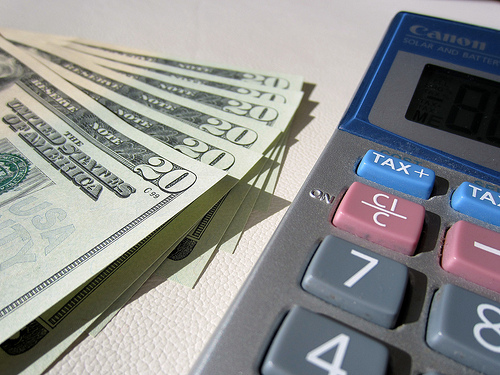
by Adam | May 8, 2015 | Credit Repair
Drafting a budget and sticking to it is the single best thing you can do for your personal finances. So why is it so hard for so many people? One reason people drag their feet when it comes to budgeting is that they think it’s difficult. It’s complicated, you tell yourself, and it will just make me feel bad about yourself, so why bother? Well, I’m here to tell you that budgeting is easy. It’s one of the easiest things to get your head around, but you have to stop thinking of it as a chore to be avoided. It’s actually the one thing that will set you free from financial bondage, and it’s amazingly simple to do. So let’s get started with the basics – Budgeting 101. Where to start: 5 Steps to Begin Your Budget Budgeting can be summed up in a single sentence: tracking money that comes out and tracking money that comes in. That’s really all you’re doing. You take a look at the money your family earns, and you take a look at the money your family spends, and you adjust the spending column so that you don’t end up spending more than you earn. Which brings us to step one of easy budgeting: 1. Track total income This is probably the easiest, and so we’ve put it first on our list. For most people, all you have to do is look at monthly salary or wages. If you have fluctuating income (maybe you do freelance or seasonal work), then you might have to do a little estimating. In that case, look at what you’ve made...

by Adam | May 1, 2015 | Credit Repair
Credit reports are long and complicated. It can feel like a pain to get a hold of them (although requesting your free annual report is a cinch). So why is it so important to stay on top of the details in your credit report? Why do you have to know what’s contained in those pages? Here are 5 of the biggest reasons why you should check your credit report regularly (at least once per year, preferably more). 1. Find errors in your report As many as 40 million Americans have errors in their credit reports. You won’t know if they are there unless you check your credit report. Also, don’t fret too much if you find an error; there are steps you can take to repair your credit, all by yourself. And if you don’t have the time or energy for DIY credit repair, there are reputable credit repair companies out there ready to help. (Ask yourself these 4 questions before hiring a credit repair company.) 2. Uncover identity theft Sometimes an error isn’t an error at all; it’s identity theft. You might not know that someone has stolen your identity until a collection agency is hounding you for a loan you never took out. If you’re regularly checking your credit report, then you can at least discover identity theft before it becomes a huge problem. 3. Make sure your credit is in good shape before you apply for a loan If you’re planning on taking out a major loan (such as a home mortgage), it’s important to be proactive and check out your credit report before you head over to the mortgage lender’s office....

by Adam | Apr 24, 2015 | Credit Repair
Unfortunately for many of us, repairing credit often involves dealing with collection agencies. Debt collectors get a bad reputation because of the questionable tactics some of them use to collect the debt, sometimes crossing over into harassment. Of course, not all debt collection companies use unethical practices, and there are laws in place to protect consumers from such tactics. In fact, the FDCPA (Fair Debt Collection Practices Act) sets several protections for consumers and makes some guidelines that can benefit your credit repair efforts as long as you know your rights and aren’t afraid to lay claim to those rights. One way you can take advantage of the FDCPA is by sending collection agencies a “Debt Validation” letter. Why Seek Debt Validation? According to the FDCPA, a collection agency must verify your debt or else it is considered invalid and they can’t report it to the credit reporting agencies. If they can’t verify the debt, they can’t attempt to collect the debt and they can’t attempt to contact you about the debt, either. If a debt collector doesn’t verify your debt, and reports the debt to a credit reporting agency anyway, then you can take them to small claims court and receive $1,000 from them as well as additional damages. How is a “Debt Collector” different from the original creditor? The difference between a debt collector and an original creditor is important, because only a debt collector is subject to the FDCPA. According to the law, a creditor is only the original entity that issued you the loan directly. A debt collector is defined as an entity that the creditor has hired to collect the debt, or an...

by Adam | Apr 20, 2015 | Credit Repair
If you’ve talked with a representative at a credit repair company, then they probably told you how long it can take to repair your credit on your own. And they’re not wrong. It takes time and perseverance to get errors removed from your credit report. You have to send letters of dispute, sometimes multiple letters to each credit reporting bureau. You have to follow up on those letters. Often you will need to hunt down your creditors, which can be easier said than done. But here’s what you probably weren’t told: it will be worth it. With some planning, organizing, perseverance and above all, patience, you will see results. Improving your credit score can save you thousands of dollars in lower interest rates. A higher score can help you get a mortgage. It can help you get a car loan. You should also keep in mind that while DIY credit repair can take a long time, almost all of that time is eaten up in waiting. The actual work of gathering your credit reports and writing dispute letters will only take a few hours each month. You’ll have to be organized so you don’t miss any crucial steps, but your actual time investment isn’t out of this world. What you will have to do is wait and have patience. Where to start: the first month Your credit repair journey begins with your credit reports. Thankfully, by law you’re entitled to one free credit report per year. You can get your free credit report at annualcreditreport.com. If you’ve already requested a free credit report, and it hasn’t been a year yet, then go ahead...

by Adam | Apr 13, 2015 | Credit Repair
It’s a little-known reality that more than 40 million Americans have errors in their credit reports. All those errors are dragging down the credit scores of millions of people. When it comes to repairing your credit, you can attempt to remove errors in your report yourself, or you can hire a credit repair company to do it for you. But before you go out and hire the first credit repair firm you can find, ask yourself these 4 question: 1. Have you tried DIY credit repair? In all actuality, there isn’t anything a credit repair company can do for you that you can’t do for yourself. You have the right to dispute any errors or erroneous items on your credit report with the credit reporting bureaus; and they are required to investigate all disputes. Actions you can take to repair your credit on your own include: Write a credit dispute letter Get a free copy of your credit report and analyze it for errors Make a plan to get out of debt, and stay out Educate yourself on the things that can hurt your credit score 2. How much time are you willing to spend on credit repair? Keep in mind that DIY credit repair takes a lot of time and perseverance. The credit reporting bureaus are large bureaucracies; it takes time for them to respond to your correspondence, and you will have to follow through and document every single interaction (if you want to see results). If you have the time and energy to repair your own credit, then you can’t beat the price of DIY credit repair. 3. Do you know the differences between...

by Adam | Apr 6, 2015 | Credit Repair
We all know that having a good credit score can help you secure a loan, get approved for a credit card, and even rent an apartment. But who can access your credit report, and who can’t? Not everyone can access your credit report, and for good reason. There is a ton of identifying information in there. In the wrong hands, someone could use your credit report to steal your identity. Thankfully, the Fair Credit Reporting Act outlines who can and cannot view your credit report. Here are the basics. Usually, You Must Give Permission for Someone to Access Your Credit Report Most of the time, you need to give your permission for someone to access your credit report. In the case of credit cards, for example, you give the credit card company permission to pull your credit report when you apply for a card. However, in the case of court orders, collection agencies and government agencies, your permission may not be required. Lenders In addition to credit card companies, banks and mortgage lenders can also access your credit score when you apply for a mortgage. The primary purpose of your credit report, after all, is so lenders can determine whether you are more or less likely to default on a loan. Potential landlords Credit checks are standard when you apply for a rental property. Similarly to lenders, a landlord wants to be reassured that you’ll pay rent on time every month, and your credit report can be a fairly accurate indicator of that. Your prospective landlord will also be looking to see if you have had any past evictions, which...








Recent Comments